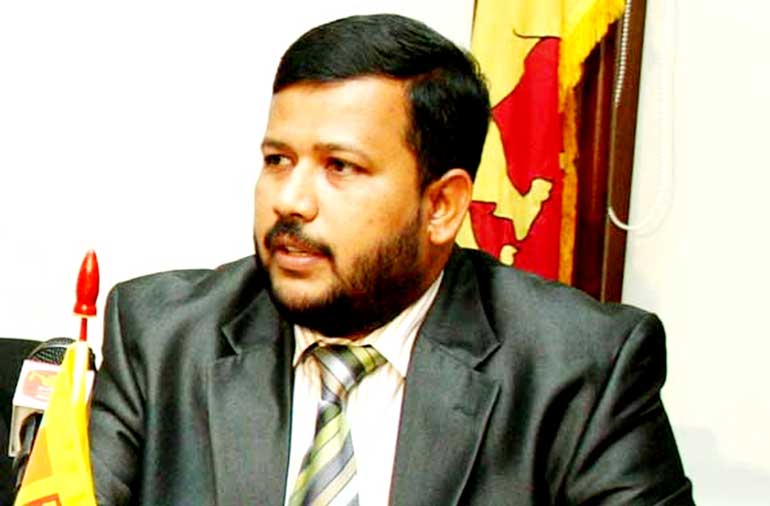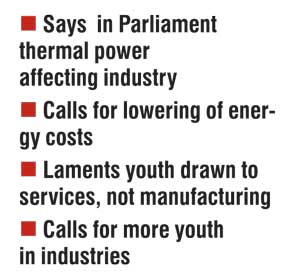Sunday Feb 15, 2026
Sunday Feb 15, 2026
Saturday, 28 November 2015 00:09 - - {{hitsCtrl.values.hits}}

Minister of Industry and Commerce Rihad Bathiudeen
 Sri Lanka’s proposed economic reforms are of such a magnitude that it is possibly the third generation of reforms in the country’s economic history-and Lankan youth are increasingly attracted to services and it is now time to enlist them to manufacturing as well, a top Cabinet Minister said in Parliament yesterday.
Sri Lanka’s proposed economic reforms are of such a magnitude that it is possibly the third generation of reforms in the country’s economic history-and Lankan youth are increasingly attracted to services and it is now time to enlist them to manufacturing as well, a top Cabinet Minister said in Parliament yesterday.
Minister of Industry and Commerce Rihad Bathiudeen, presenting his Budget speech in Parliament, also called for lowering of energy costs to sustain the country’s manufacturing competitiveness.
“I commend Prime Minister Ranil Wickremesinghe’s call for clear long term economic policy for Sri Lanka to become a highly competitive social market economy,” he said.
The proposed reforms could be considered the third generation of “economic reforms in Sri Lanka’s history,” said Minister Bathiudee.
“As Industry Minister, I stress that industries are one third of our GDP, with another 60% from the services sector.
Our industry base is mostly manufacturing, rather than mining or ‘electricity gas and water supply.’ In fact, 99% of our industry is in manufacturing and this sector is diverse with some world-class segments such as apparels, rubber, packaging, stationery, and print material. The industrial development of the country is vital for us to transform into a strong economy in Asia. Still, we also need to focus on cost of manufacturing for this to be truly effective and productive. It is important for us to minimise power costs in our manufacturing. We pay between $4 billion to 5 billion for oil imports and about one-fourth of our import costs are for oil. Since thermal power is the key power supply at 70% of the supply, our manufacturing energy costs need to be lowered further, with the reduction of thermal energy. Studies also show that power demand will increase from industries in the future as the result of a more complex economy and households due to rising incomes. Today, I appeal our Prime Minister to integrate this power situation too in to the above economic reform plans, so that our manufacturing and industries are even more cost effective.“
According to studies, 20% of imported oil is used for power generation while the demand for power is expected to grow by 5% per year.
Speaking on the need to engage more youth into manufacturing, Minister Bathiudeen sadi, he believed that the plan to provide one million jobs in the coming years is a great step forward for our youth.
“This action will also pave the way to integrating our youth more closely to our economic reform process. Still, I wish to bring to you an important aspect in this regard so that our current plans will become more effective. One important trend is that our youth are increasingly attracted to service sector jobs, and their education and training is also more focused on service sector and service excellence rather than industry orientation. One reason I believe is that there is a lack of wide availability of industrial training and development opportunities. Also, the skills mismatch and strong focus by everyone on a few types of attractive employment that is competitive for certain types of jobs have created this situation. To develop our education, the Prime Minister’s vision to create short-term skills and improve the quality of our primary, secondary and post-secondary education is commendable. It is also time that we integrate more industrial training ito our education sector and enhance existing vocational training schemes across many more subjects. Technology education should not only be for ICT and computing but also for industrial and machine technologies as well as new health and medicine and innovation sectors. When I say machine technologies I do not mean to say Juki sewing type of training only. Here I focus on advanced industrial training such as nano-technology and innovation focus.”